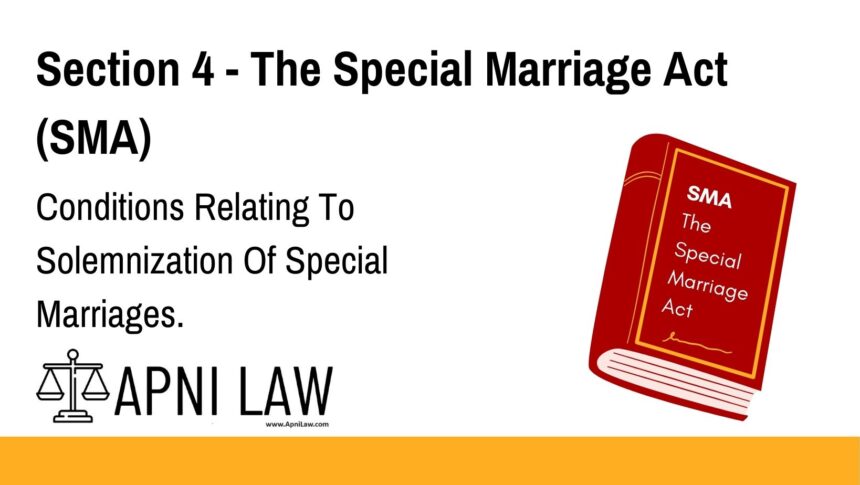Code: Section 4 – Conditions for Marriage under the Special Marriage Act, 1954
Notwithstanding anything contained in any other law for the time being in force relating to the solemnization of marriages, a marriage between any two persons may be solemnized under this Act, if at the time of the marriage the following conditions are fulfilled, namely:—
(a) Neither party has a spouse living;
(b) Neither party—
(i) is incapable of giving a valid consent to it in consequence of unsoundness of mind; or
(ii) though capable of giving a valid consent, has been suffering from mental disorder of such a kind or to such an extent as to be unfit for marriage and the procreation of children; or
(iii) has been subject to recurrent attacks of insanity;
(c) The male has completed the age of twenty-one years and the female the age of eighteen years;
(d) The parties are not within the degrees of prohibited relationship:
Provided that where a custom governing at least one of the parties permits a marriage between them, such marriage may be solemnized, notwithstanding that they are within the degrees of prohibited relationship;
(e) Where the marriage is solemnized in the State of Jammu and Kashmir, both parties are citizens of India domiciled in the territories to which this Act extends.
Explanation.—In this section, “custom”, in relation to a person belonging to any tribe, community, group or family, means any rule which the State Government may, by notification in the Official Gazette, specify in this behalf as applicable to members of that tribe, community, group or family:
Provided that no such notification shall be issued in relation to the members of any tribe, community, group or family, unless the State Government is satisfied—
(i) that such rule has been continuously and uniformly observed for a long time among those members;
(ii) that such rule is certain and not unreasonable or opposed to public policy; and
(iii) that such rule, if applicable only to a family, has not been discontinued by the family.
Explanation of Section 4 of the Special Marriage Act, 1954
Section 4 of the Special Marriage Act lays down the essential conditions that must be fulfilled for a marriage to be valid under this legislation. It enables individuals of any religion, caste, or community to enter into a civil marriage based solely on mutual consent and legal compliance.
Key Conditions:
- 🔹 No existing spouse: Neither party should be already married to another person.
- 🔹 Mental soundness: Both individuals must be mentally capable of giving valid consent and not suffering from any serious mental disorder or recurrent insanity.
- 🔹 Minimum age: The male must be at least 21 years of age, and the female at least 18.
- 🔹 Prohibited relationships: The couple must not fall within the prohibited degrees of relationship unless custom allows it.
- 🔹 Jammu & Kashmir condition: If the marriage takes place in J&K, both parties must be Indian citizens domiciled in the territories to which the Act extends.
Explanation on Custom:
The term “custom” refers to traditional practices recognized by law and specifically notified by the State Government. However, such customs must meet strict criteria:
- They should have been consistently followed over a long period.
- They must be definite, reasonable, and not violate public policy.
- If family-specific, they should not have been discontinued.
Illustration
Example 1: Interfaith Marriage
Ravi (Hindu) and Sara (Christian) want to get married without converting. As long as they meet all the conditions under Section 4—such as age, marital status, and mental capacity—their marriage can be solemnized under the Special Marriage Act.
Example 2: Custom Overrides Prohibited Relationship
Two individuals related within a customary prohibited degree belong to a tribal community where such marriage is recognized. If the custom is officially notified under the Act, their marriage is valid under Section 4(d), despite the relationship.
Common Questions and Answers on Section 4 SMA
1. Can people from different religions marry under the Special Marriage Act?
Yes. Section 4 enables any two individuals, regardless of religion or caste, to solemnize their marriage provided they meet the conditions specified.
2. What is the minimum age for marriage under this Act?
The minimum legal age is 21 years for men and 18 years for women.
3. What happens if one person is already married?
The marriage will not be valid under this Act. Both parties must be unmarried, divorced, or widowed at the time of registration.
4. What is meant by “degrees of prohibited relationship”?
These are close blood relations (like siblings, uncles/nieces, etc.) where marriage is not allowed. However, if there is a valid and recognized custom permitting such marriages, they may still be solemnized under this Act.
5. Does this section apply to marriages in Jammu and Kashmir?
Yes, but with a condition. Both parties must be Indian citizens domiciled in the territories to which the Act applies.
Conclusion
Section 4 of the Special Marriage Act ensures that marriages solemnized under this law meet minimum legal, mental, and social criteria. It emphasizes consent, age, mental health, and the absence of close kinship—ensuring both legality and fairness. This section forms the foundation for civil marriages in India, promoting secularism and equality in marital laws.
For expert legal advice and in-depth insights on marriage laws, visit ApniLaw today.








